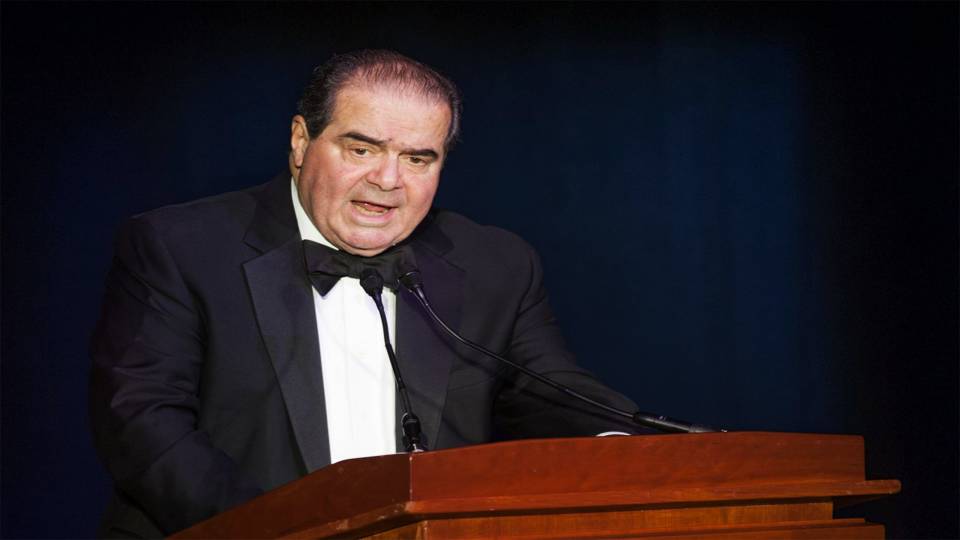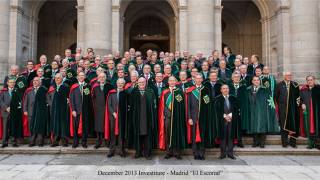Justice Scalia Spoke Favorably of Trump’s Presidential Run
Shortly before his death in February 2016, Supreme Court Justice Antonin Scalia spoke favorably of Donald Trump’s presidential run.
“Justice Scalia thought it was most refreshing to have a candidate who was pretty much unfiltered and utterly frank,” said the late jurist’s literary collaborator, Bryan Garner, a legal dictionary editor who spent two weeks in 2016 traveling with Justice Scalia through several Asian countries.
The justice thought well of Scott Walker, the Wisconsin governor whose campaign for the Republican nomination stalled, said Mr. Garner, whose memoir of a decadelong friendship, “Nino and Me,” comes out Tuesday. “But he was fascinated by the fact that Trump was so outspoken in an unfiltered way, and therefore we were seeing something a little more genuine than a candidate whose every utterance is airbrushed,” Mr. Garner said in an interview.
While Justice Scalia may have approved of many of Mr. Trump’s conservative judicial nominations, Mr. Garner declined to speculate on how he might have viewed other aspects of his presidency. “These [were] early days in the campaign. It shouldn’t be looked at through the lens of everything that’s happened since,” he said.
Justice Scalia’s death, just a week after he and Mr. Garner returned from their Asia tour, played a role in the Trump campaign. Mr. Trump has credited his victory in part to promising to nominate a successor “very much in the mold of Justice Scalia,” a pledge that endeared him to a GOP base opposed to abortion rights and same-sex marriage.
Justice Scalia dissented in sarcastic tones from each of Justice Anthony Kennedy’s four opinions that elevated gay people from the status of criminals to sharing with heterosexual couples the right to marry. Mr. Garner’s memoir reveals that Justice Scalia hesitated over one of the most provocative lines from the last such dissent.
“I’m thinking about criticizing a colleague’s writing style,” Mr. Garner recounted the justice as saying. “Do you think that sort of commentary is permissible?”
“‘Nino, for a stylist like you, it’s almost irresistible,’ I said, ‘as it would be for me. That’s especially so if the bad writing you’re criticizing reflects bad thinking.’
“‘I’m thinking about saying I’d rather put my head in a bag than join in such a badly written opinion,’” Justice Scalia said, without disclosing which case or colleague might be involved.
Mr. Garner urged him to drop the phrase, saying, “If you sound like a bitter old man, people will discount what you say.” The justice responded, “I suppose you’re right.”
When the court delivered the marriage case, Obergefell v. Hodges, in June 2015, Mr. Garner saw the “head in a bag” phrase in Justice Scalia’s dissent, which only Justice Clarence Thomas joined.
“He was a man of pugnacity, and he just couldn’t help himself when he thought he had a knockout punch,” Mr. Garner said in the interview.
“Nino and Me,” referring to the nickname the justice’s friends and colleagues used, focuses on neither Justice Scalia’s jurisprudence nor the details of his life. Rather, it is Mr. Garner’s account of two rather different men coming together through a love of language.
Their story begins with an unassailable literary matchmaker: the novelist David Foster Wallace, whose enthusiastic review of Mr. Garner’s usage dictionary led the lexicographer to contact him. It was Mr. Wallace, the book recounts, who suggested he seek an interview with Justice Scalia for a series of video chats on writing Mr. Wallace was conducting.
After discovering, among other retrograde traits, their shared preference for the second edition of Webster’s New International Dictionary over the third, Mr. Garner proposed they write a book together on persuasive techniques for lawyers. Reticent at first, Justice Scalia eventually succumbed to Mr. Garner’s entreaties, and the two produced that book, “Making Your Case,” and their grand cyclopedia of statutory construction, “Reading Law.”
The book describes their sometimes-rocky writing partnership. “It looked for a time that we might actually break up the collaboration over contractions,” said Mr. Garner, who argued contractions aid readability while the justice shuddered at the thought of don’ts and didn’ts diminishing the dignity of court opinions.
One evening in Mr. Garner’s Dallas home, the dining companions included former White House Counsel Harriet Miers, whose Supreme Court nomination by President George W. Bush collapsed amid a fusillade from conservative activists unconvinced she would hew to their hard-line views.
Justice Scalia was impressed by “how intelligent she was,” Mr. Garner said, and told him later he “thought she would have made a good colleague.”
Mr. Garner, 59 years old, grew up in the Texas Panhandle and became a force in legal writing as editor of Black’s Law Dictionary and other reference works.
A Republican with libertarian leanings, Mr. Garner personally favors abortion rights, same-sex marriage and gun control, all anathema to Justice Scalia’s conservatism. Where Justice Scalia was a faithful Catholic who insisted upon the traditional Latin Mass, Mr. Garner took little interest in organized religion.
But those differences didn’t—or did not—matter, Mr. Garner said. He was going through a divorce during this period, and he came to view Justice Scalia as something of an unofficial uncle.
“It’s fundamentally a book about friendship,” Mr. Garner said. Yet he acknowledged that he was the sidekick in a partnership of unequals, adding, “That makes this friendship all the more surprising.”






















